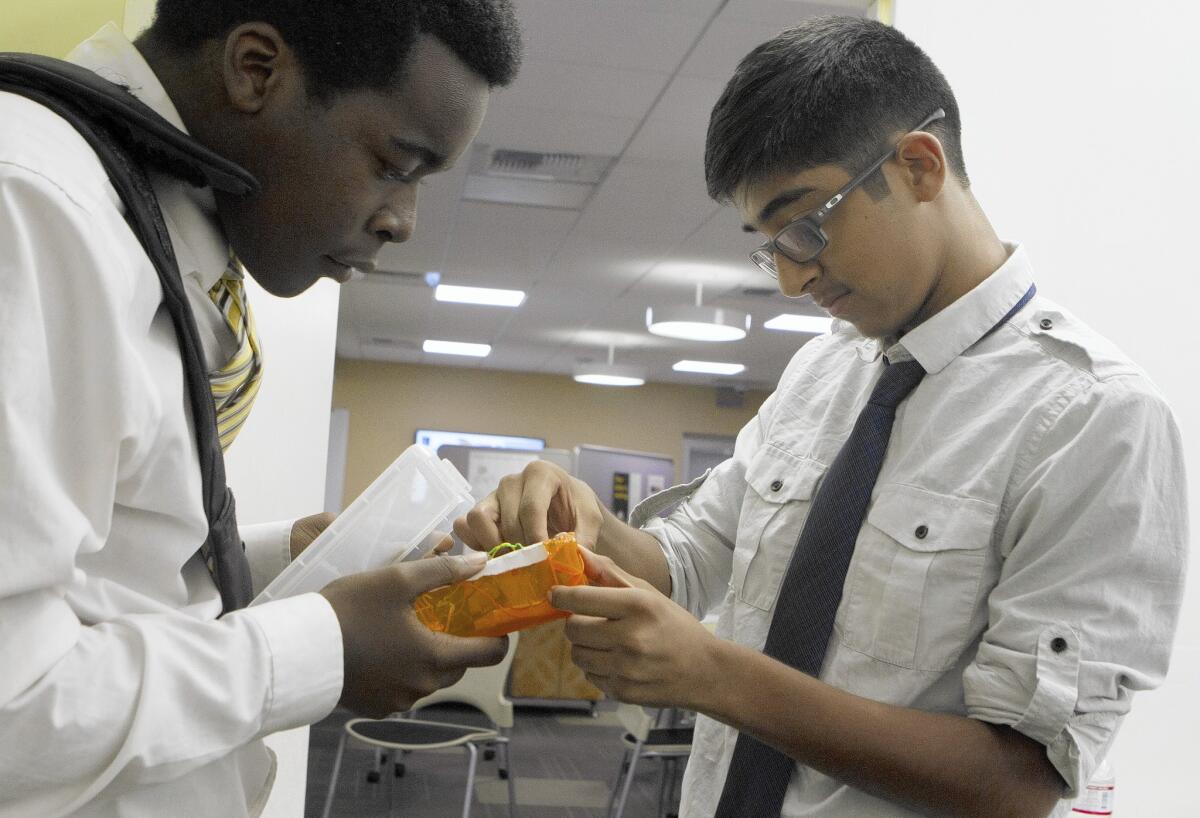Breaking socioeconomic codes at computer camp

- Share via
It was Luis Garcia’s turn to say his name — loud and clear before the class.
But the 17-year-old stood frozen, delaying his team’s presentation.
“We won’t judge you,” a classmate shouted.
“You can do it!” said another.
After a summer of hard work, Garcia and 36 other students took turns recently practicing pitches that could earn them a chance to launch their own mini technology company.
The stakes were set at South L.A. Demo Day, a contest at USC on Saturday with judges from big companies such as Google and Yahoo.
The program is part of a South Los Angeles nonprofit called Urban Teens Exploring Technology, or Urban TxT. The organization recruits black and Latino youths from places such as Compton and Watts and teaches them how to build websites and cellphone apps.
Students gathered for an intense 15-week summer camp at USC to learn the basics of coding and computer programming. They were encouraged to create new technology that will better their community.
But beyond technical lessons, what teacher Oscar Menjivar pushes most is leadership and confidence, even if it means making students blush once in a while.
“Come on, come on, “ he urged Garcia, who nervously looked to the floor. “We’re waiting. I want to hear you scream your name.”
The high school senior eventually worked up the courage and was rewarded with a round of applause.
Menjivar, a Salvadoran who grew up in South L.A., co-founded Urban TxT six years ago.
He wanted more youth in the area — particularly boys who face the most pressure from gangs — to learn about careers in technology.
“Everybody knows if you want to find a good basketball player, a good football player, you look in the inner city,” Menjivar said. “But where do you go to find the next leaders of the tech industry? I want people to say, ‘We go to South L.A.’ ”
Menjivar runs the program with a mix of tough love and inspiration. He gets help from volunteers, donations and a few grants. For several years he had no place to train his students, so they would work out of a Starbucks or he would have them sit on a nearby lawn, within range of free Wi-Fi from USC.
Recently, he leased a 750-square-foot space in South L.A. He calls it The Cube. From there, he plans to expand the youth program and help the local community with technical needs.
This year, with support from a Silicon Valley entrepreneur, the winner of Demo Day will get $2,000, plus other prizes, to bring their idea to life.
For many of the kids, the opportunity could be life-changing, Menjivar said.
All come from rough and poor backgrounds. Some live in the projects; they take buses and trains to campus. They spend full days inside the computer science building, a place where college students are often white or Asian.
In the computer lab, they’ve come up with team names and all kinds of pitches. Team Sumato created an electronic device that keeps people from forgetting their keys, phone and wallet at home. Team N-lighten came up with a web app to help teens save money for college. Team Schoolverse is pitching an app that promises to increase attendance at high school events.
Jonathan Marcelino, 16, from Watts, enrolled in the camp three years ago. He was curious about computers growing up, but his parents couldn’t afford one. He used to take apart old VCRs and televisions to teach himself.
“When I found out about this I was so excited,” Marcelino said. “I wanted to learn everything.”
He and his teammates developed Groupie, an app that helps people take and share group photos without having to message the images or switch cameras.
While many, including Marcelino, have learned to be more confident through the program, others have learned to be team players.
Layquawn Windley, 15, said he came into Urban TxT with the “cockiness of an athlete.” The 11th-grader said he likes computer programming, but he hasn’t settled on a career.
“I want to be what you call a renaissance man, a man of all trades,” he said.
His team has taught him to be more selfless and considerate of others. He’s made friends with boys who he would never have thought to talk to outside the program, Windley said.
On Saturday, his team hoped to win Demo Day by pitching Bond, a Yelp-like app that lists and rates fun and safe hangout spots for youths and families.
“We’re going to go up there, give it our best, and we’ll see what happens,” Windley said.
In the end, his team’s hard work paid off as judges chose them as the winner.
esmeralda.bermudez@latimes.com
Twitter: @LATbermudez
More to Read
Sign up for Essential California
The most important California stories and recommendations in your inbox every morning.
You may occasionally receive promotional content from the Los Angeles Times.














